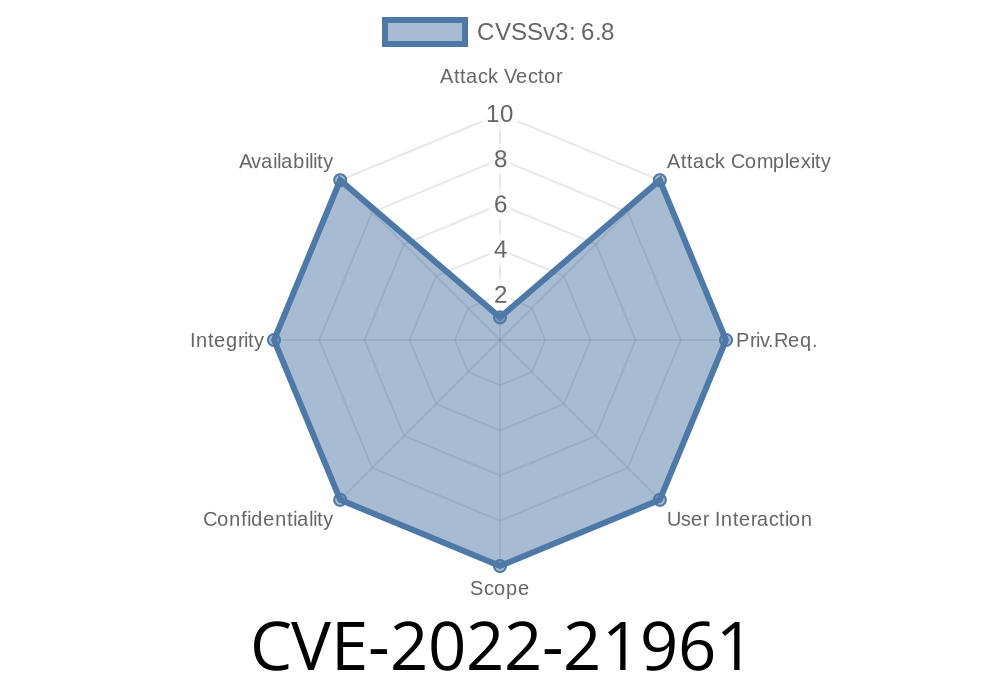In early 2022, Microsoft patched CVE-2022-21961, a critical Remote Code Execution (RCE) vulnerability in the Windows Resilient File System (ReFS). This deep-dive post explains the bug in straightforward language, demonstrates how an attacker could exploit it, and provides code snippets to illustrate the process. We’ll also link official advisories and keep things simple for learners and seasoned defenders alike.
What is ReFS?
ReFS stands for Resilient File System. Microsoft designed it to be highly resilient against data corruption and is commonly used for servers, high-availability applications, and storage pools. But just like any complex system, it can have flaws.
Patched on: January 11, 2022
CVE-2022-21961 is a vulnerability in ReFS where crafted requests could let remote attackers run code in kernel mode.
Is it Related to Other CVEs?
This vulnerability is unique among related file system bugs:
CVE-2022-21963
Each of those deals with different issues or parts of the Windows file stack.
The Core Problem
Attackers can send specially crafted file system requests to a vulnerable Windows host exposing an ReFS volume (for example, via SMB file sharing), and exploit how ReFS parses certain on-disk structures. The core issue is not validating input, so a malformed disk structure can lead ReFS to execute untrusted code.
In simple terms:
If an attacker can write data to a ReFS volume or get you to mount a malicious disk image, they may be able to execute code on your system at the highest privilege level.
Deliver the Payload:
The image is delivered via spear-phishing (as an attachment or download) or over the network (e.g., via SMB file share).
Trigger the Bug:
When the target mounts the volume, the malformed metadata causes the vulnerable code path to execute, running the attacker’s code.
Example Code Snippet: Creating a Malicious Volume
Below is a pseudocode snippet (conceptual) showing how someone might create a malformed ReFS volume:
# Note: This is an illustrative example!
import struct
# Create a blank file (serves as a disk image)
with open("malicious.refs.img", "wb") as f:
# Write legitimate ReFS header
f.write(b'REFS') # Magic bytes
# Write malicious metadata block
# Let's say, a buffer that's larger than expected to trigger overflow
metadata = b'A' * 2048 # Overly long, triggers bug
f.write(metadata)
# More fake data to simulate real disk layout...
f.write(b'\x00' * 1024)
An attacker would fine-tune this to hit the specific struct or function ReFS mishandles.
Full compromise: Code executes in kernel mode (SYSTEM privileges)
- No user interaction required: If auto-mount or file indexing is enabled, just opening a folder can trigger it
Microsoft Security Guide:
ADV220005 | January 2022 Security Updates
Disable Auto-Mount: If your environment does not need it, turn off automatic disk mounting.
4. Network Exposure Checks: Don’t expose internal file shares or ReFS volumes outside your network.
Microsoft Security Update Guide (Official Advisory):
https://msrc.microsoft.com/update-guide/vulnerability/CVE-2022-21961
NVD Entry:
https://nvd.nist.gov/vuln/detail/CVE-2022-21961
Patch Tuesday Summary:
BleepingComputer Jan 2022 Patch Tuesday
Conclusion
CVE-2022-21961 is a serious flaw in Microsoft’s ReFS that could let an attacker run code on your system just by tricking you into mounting a malicious volume. The lesson? Always patch,, be careful with disk images, and restrict file system sharing. As of now, there are no known public exploits, but the technical details are out there, and defenders should stay ready.
Timeline
Published on: 01/11/2022 21:15:00 UTC
Last modified on: 05/23/2022 17:29:00 UTC
